When Trinity United Methodist Church in Idaho Falls, Idaho, underwent a big renovation in 2019 — installing showers and a washer and dryer and updating its kitchen — the Rev. Ruth Marsh figured they would be used sparingly by Scout troops and other church groups.
Little did she know that those upgrades would become a vital part of the church’s ministry.
Amid the pandemic, Trinity’s pastor realized that the church now could meet some of the needs of the area homeless, offering them opportunities to eat, shower and do laundry.
“Many coming here are the working poor; many of them live in their cars,” Marsh said. “If you’re going to work, you need to have had a meal, taken a shower and have clean clothes.
“People have come here and said, ‘I feel human again because I can get cleaned up, have a meal with other people and have someone listen to my story.’”
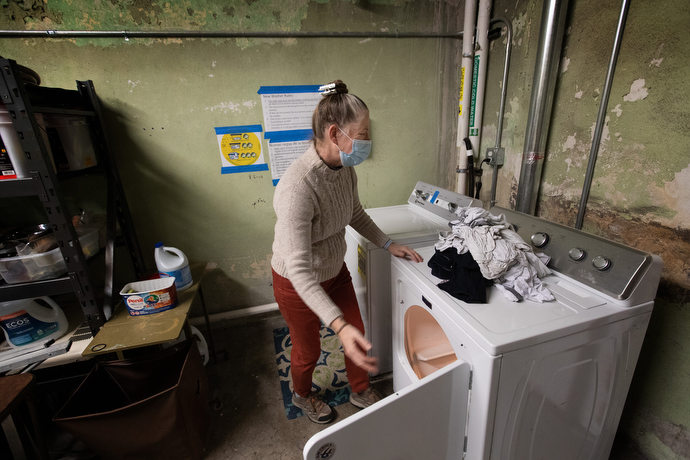
As COVID-19 lockdowns began in 2020, Marsh thought about Trinity’s now-empty sanctuary and began opening the building up at night for men to sleep, since there were already women’s shelters in the city. However, church leaders found out that the church lacked the proper sprinkler system to legally house people overnight, so they focused on becoming a day shelter.
The doors open every day at 9 a.m. for breakfast and, except for a break in the afternoon, the shelter stays open until 8 p.m.
“We do breakfast because if you miss dinner at the rescue mission at 6, then you’re out of luck until the soup kitchen serves lunch at noon,” Marsh said.
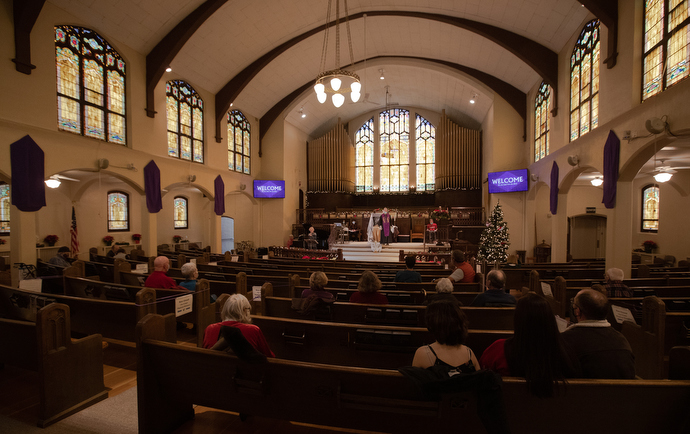
Robin Stewart, head of Trinity’s administrative council, calls the day shelter “the one good thing out of the pandemic.”
“It’s exposed us to a population we didn’t know and, more importantly, it’s allowed that population the courage to come into a church,” he said. “A lot of them have been judged and they don’t feel comfortable.”
Marsh emphasizes that no one who seeks help at the day shelter will be judged. There are only two rules: You must wear a mask at all times, and you must be on your best behavior.
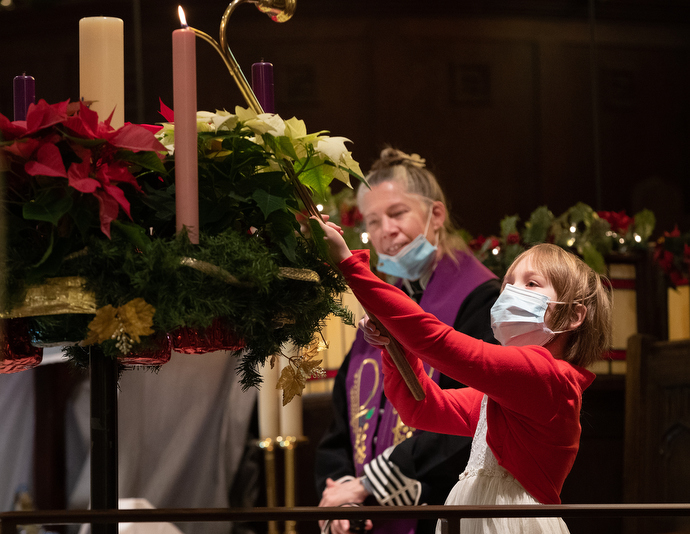
Don Rohde, Trinity’s head of trustees, said that many shelters require people to be clean and sober to enter. As substance abuse and self-medication for mental health problems are rampant in the homeless community, he considers this a barrier for those seeking help.
“Our approach is, ‘We love you like you are,’” he said. “We realize that they will be on drugs and using alcohol when they come to us, and we accept that as part of who they are and the starting point they have to work from.”
Jeff Andrew, who has been coming to the day shelter for several months now, describes it as a lifesaver.
“I can’t emphasize enough what it’s like if you’ve been without a shower for a few days … can’t wash clothes or brush teeth. Just to have that is such a big deal,” he said.
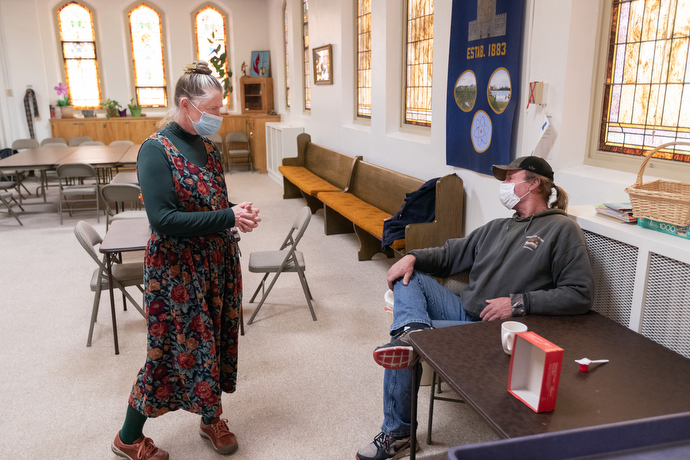
Andrew has a house, but it lacks hot water and only has electricity in a few rooms. He first showed up needing help to acquire medication. He has schizoaffective disorder and had lost his antipsychotics.
The folks at Trinity helped him get more medication, fill out forms for a replacement ID and enroll in school. He recently moved to Louisiana to attend the University of New Orleans for art studies and to redevelop technical writing skills.
“I haven’t always been in this situation. I’ve been in school, had professional jobs,” he said. “Situations that were out of my control or I didn’t know how to deal with properly put me in this situation.”
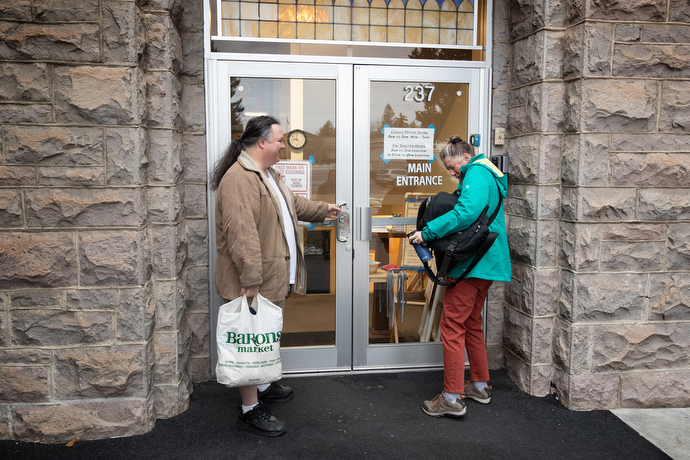
Marsh said she’s been impressed by the strength of people she’s met at the day shelter.
“I’m always in awe that people can still put one foot in front of the other when I hear their stories,” Marsh said. “It’s a mean old world out there, and you can’t do it on your own.”
Nathaniel, who stays up all night and comes to Trinity for a safe place to sleep during the day, said, “I don’t like being cold and I don’t like being homeless, but I have no choice. A lot of people, if they put themselves in my shoes, they’d kill themselves.”
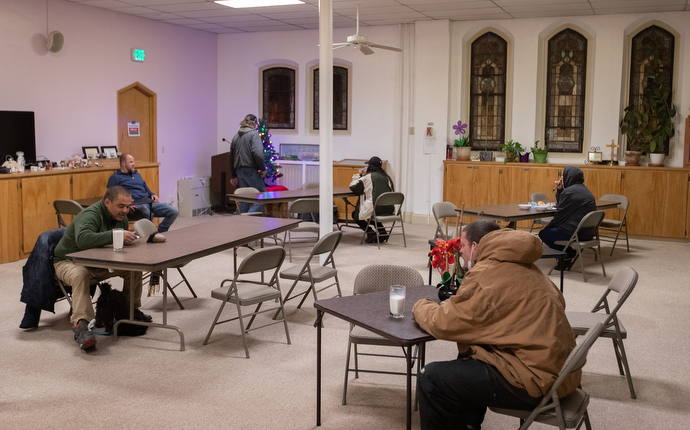
The services Trinity provides have expanded since the day shelter began. Many of their guests need help navigating the legal system to try to get back on their feet.
“Once someone becomes homeless, they’re pretty much trapped in that situation,” Rohde said. “Once you see what they have to go through, it switches you from feeling that they’re not participating to feeling bad about society erecting the barriers.”
Watch video, learn more
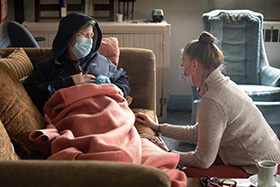
UM News interviewed the Rev. Marsh, members of Trinity United Methodist Church and guests of the church's day shelter.
Watch now.
Ask The UMC has resources for those facing homelessness.
Read more.
Rohde describes a long list of issues that must be addressed. Since homeless people by definition have nowhere to keep their belongings and are robbed on a regular basis, most have lost important paperwork, identification or driver’s licenses. A permanent address and photo ID are necessary for just about any government assistance, so the church helps people get new IDs and allows them to use the church address to receive mail. They also assist with getting Medicaid cards so guests can visit a doctor and get care and prescriptions for any physical or mental issues.
“We fill in those little gaps the system isn’t equipped to meet,” said Bev Kemp, a member of Trinity’s Friends in Service Here ministry. She said the ministry also has aided people in buying proper work equipment such as non-skid shoes that are required for kitchen work, as well as helping children with school supplies.
“So often I’m asked, ‘Why do you help those people? They’ll just spend the money on drugs.’ Maybe so, but no one sat the whole family down at breakfast and said, ‘We have $10, what shall we spend it on?’ The kids didn’t get a vote,” Kemp said.
She points out that one job loss, one car accident or other catastrophe could put anyone in the same situation, which is why this ministry is so important to her as a “cradle Methodist.”
“I’ve never been as proud of a local church I’ve belonged to as I am of Trinity,” she said. “It’s the whole Wesley thing: doing what I can, where I am, with what I’ve got.”
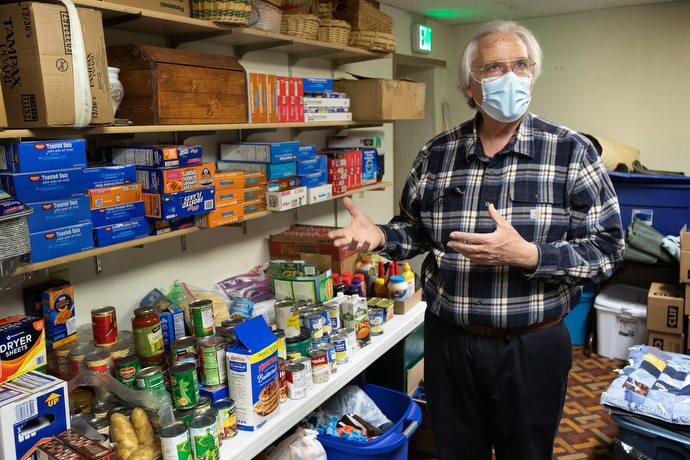
A number of people who come to the day shelter wind up finding ways to give back for the help they receive.
Angi Rogers initially came to the shelter asking for a blanket. Newly homeless, she was sleeping in her truck. She became a volunteer cook for the shelter and said she considers the staff to be family. She even helped prepare a home-cooked Christmas meal.
“They’ve helped me with my medicines; they’ve taken me to the hospital,” she said, “and this is my way of giving back. It makes me feel like I have a purpose.”
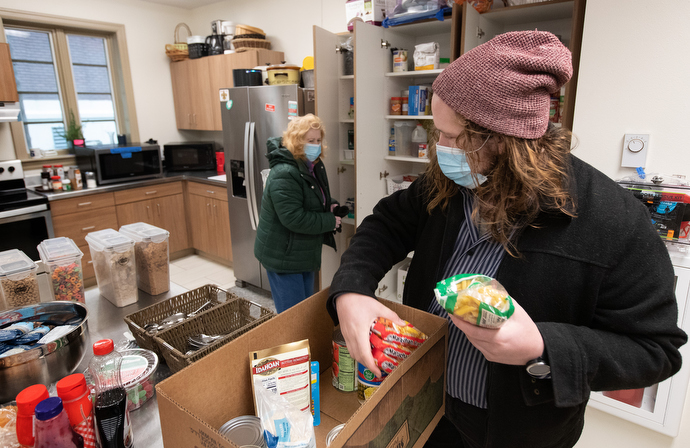
Perhaps no one has given back more than Logan Pickens, who first showed up at the day shelter nearly two years ago for laundry services … and then Marsh found out that Logan played piano.
“In every church, it’s true: When they find out you’re a pianist, you get sucked in,” Pickens said.
Struggling with addiction, Pickens became homeless during the pandemic and lived in the sanctuary for a time. They became the breakfast cook for the day shelter and, later, helped run the audio/visual equipment for online worship.
Now, Pickens is, in their words, “the makeshift Ruth,” relieving Marsh from the long hours she puts in every week. They currently live with Marsh and her husband, David, and have started school to study information technology.
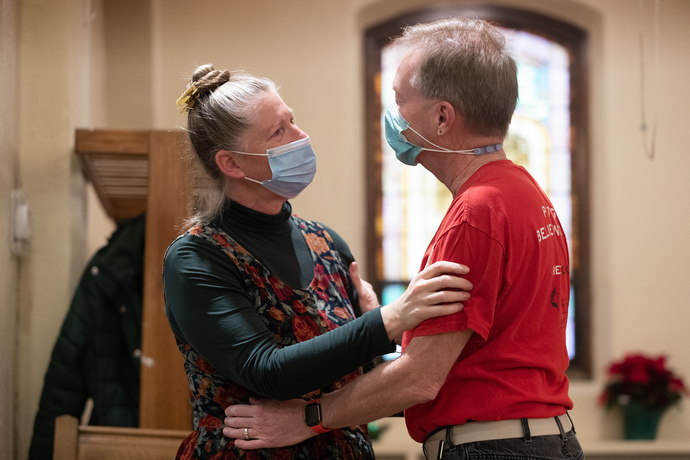
Marsh describes Logan as the day shelter’s “pied piper,” working within the homeless community to advocate for Trinity as a trusted place.
“I’m kinda the prototype for what this program would eventually become,” they said. “I was the first person Ruth helped out. She had some one-on-ones with me, reintroduced relationships with me, really kind of rehumanized me in a way I didn’t think would be possible.”
Trinity is a small congregation of less than 100 people, and running the day shelter isn’t cheap, but they’ve found ways to make it work.
Rohde researches and secures grants from the city, federal government and elsewhere. Community partners offer support as well, such as the local food pantry that sends items it can’t use, or the Catholic charity that donates towels. Volunteers from the congregation provide meals.
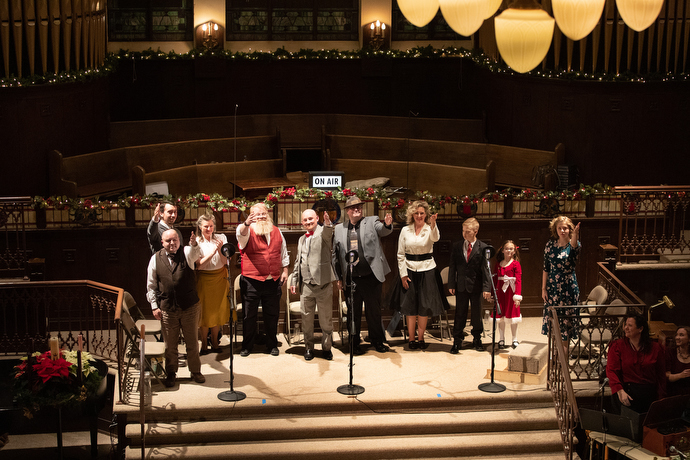
In December, the Snake River Radio Players, an acting troupe that performs at Trinity, staged a fundraising production of “It’s a Wonderful Life” that yielded $1,000 for the day shelter.
Rohde said the monthly budget is about $3,000, of which two-thirds goes to paying the janitor and the doorkeeper, and the rest pays for groceries. He estimates that the shelter goes through 30 gallons of milk, 30 boxes of cereal, 15 pounds of sugar and “lots” of butter every week. They logged 395 showers and 135 loads of laundry in November, and soon will be adding a second washer and dryer to accommodate the need.
“As an accountant, I would worry about the spending, but when someone comes through the door at 9 in the morning and can’t sign in because their hands are so cold they can’t bend their fingers, it doesn’t matter how much it costs,” Rohde said.
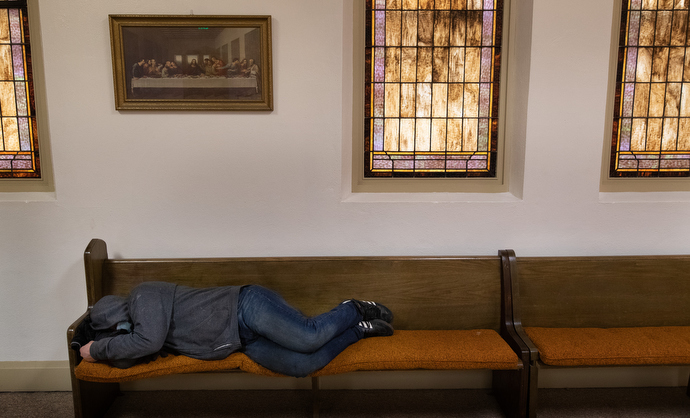
Marsh hopes that other churches can see Trinity’s success and realize they could do something similar in their community. She calls showers and laundry “low-hanging fruit” that don’t cost much, and didn’t even dramatically affect the heat or water bill.
“I try to show other people how satisfying this ministry is, and once they come in the door, they see it for themselves,” she said.
Kemp encourages others to take a leap of faith.
“If you think you don’t have the resources, if you think your church is too small to take it on — do it anyway,” she said. “The resources will come; the community will help. When you’re doing God’s work, it just happens.”
Butler is a multimedia producer/editor and DuBose is staff photographer for United Methodist News. Contact them at (615) 742-5470 or newsdesk@umcom.org. To read more United Methodist news, subscribe to the free Daily or Weekly Digests.




